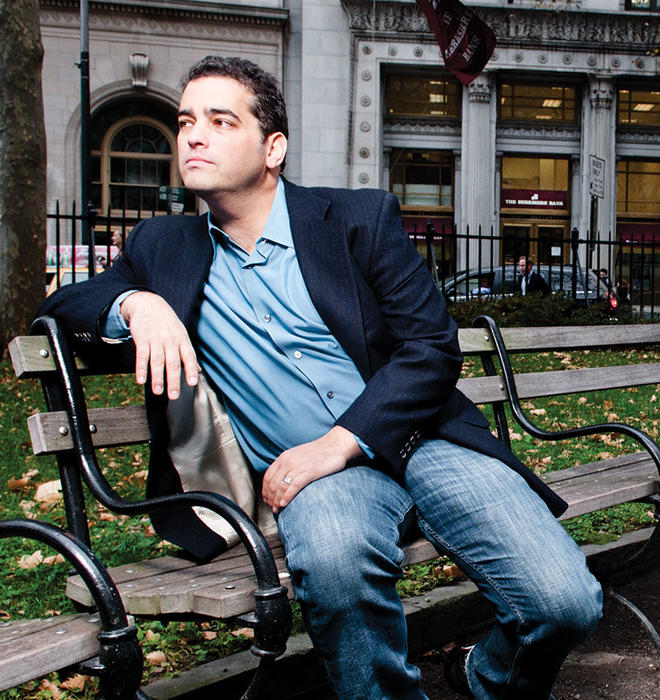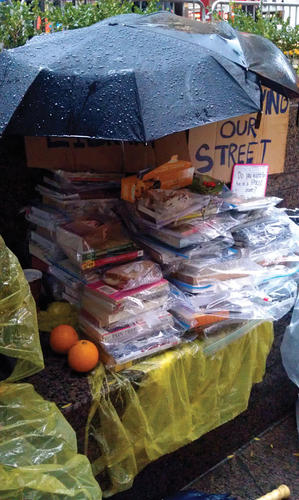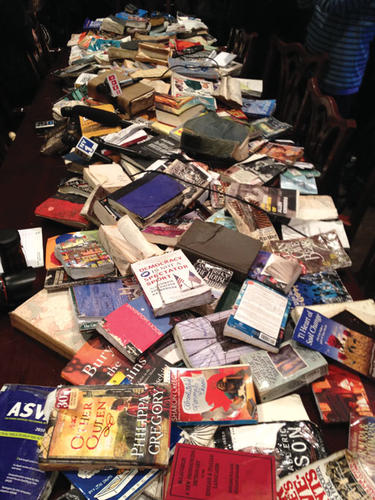
ON BOOKS: Searching for myself at The People's Library
Jeff Kreisler ’95 visited another New York library
On the sixth day that protesters were occupying Lower Manhattan’s Zuccotti Park, I gave my book to an angry grandma. She tossed it aside with dramatic flair befitting a protester animated by a lifetime of injustice.
A month later, I was reading The Occupied Wall Street Journal and learned that my satire, Get Rich Cheating, had made it into the collection of The People’s Library, the “collective, public, open library of the Occupy Wall Street leaderless resistance movement.”
Occupy Wall Street can be whatever the observer wants it to be: a gathering of revolutionaries, a bunch of dirty hippies, the worst Outdoor Action trip ever. To me, it’s a group expressing anger — not at the rich, powerful, and connected, but at the fact that so many of those rich, powerful, and connected people got and stayed that way by gaming the system. By cheating. So, of course, in my delusional world, my book is about what they’re about, only funny. (For what it’s worth, in my delusional world, I am also taller.)
What excited me about The People’s Library, even more than the movement itself, was that, because it was embedded in a cacophony of conversation and argument and protest and dissent — a shush-free zone — it was even closer to the true idea-swapping spirit that inspired the very invention of the library, by, let’s say, Dr. Jonas Von Ou-Est-La-Biblioteque. (Source: Wikipedia. Probably.)
So I went to find my book and see if anyone was reading it.
About 15 people were browsing, a handful of little kids were making colorful signs, and hundreds of protesters, reporters, and the curious were passing through, all pausing for at least a beat to take in the scene. Plastic storage bins holding thousands of books lined the benches and the ground and sat atop tables. There was no checkout desk — in fact, there was no checkout. Or fines for slow readers. “If you think you could put a book to good use long-term, by all means, keep it,” the library explains in its FAQ. The library did have a small computer and hanging poetry clippings, suggesting how it was very much like any other public library. Eclectic, well-tended, and on the verge of closing because of bad budget decisions.
That day’s volunteer librarians — Sean, a librarian by trade; and Betsy, the Brooklyn mother of the kids making signs — were sorting the recently donated books. Neither had heard of Get Rich Cheating, but they said I probably could find it in the bins. I think that’s what they said: A drum circle had metastasized behind my ear.
Where to start? The People’s Library had sections, but no comedy section, no fake wealth-building section, no books-that-justify-the-author’s-decision-not-to-be-a-lawyer section (though the philosophy and substance-abuse sections were close). Maybe business? Nope. Politics? Nah uh. Poetry? Food and chess? The catchall “isms” section? No sir. No book.
Meanwhile, thoughtful, passionate, and loud conversations were taking place all around me, and the search for my own book started to feel selfish and tone-deaf. So I stopped looking. I talked. I listened. I spoke with Katrina vanden Heuvel ’81, editor and publisher of The Nation, whose book The Change I Believe In: Fighting for Progress in the Age of Obama was there, as were copies of her magazine. She spoke passionately about how a library is the heart of many communities and how these protesters were fortifying themselves with books and ideas. That seemed noble.
Life Inc: How Corporatism Conquered the World, and How We Can Take it Back, by Douglas Rushkoff ’83, also was in The People’s Library’s collection. Rushkoff gave a talk and impromptu teach-in as part of The People’s Library readings series, which had some readings that were inspirational and on point, and others just for fun. Rushkoff had to use The People’s Microphone, through which successive circles of listeners repeated his words to those farther back. Hearing every phrase repeated ad infinitum is every author’s dream ... or nightmare. (Narcissists are the 99 percent!)
I decided that, the very next day, I’d immerse myself in The People’s Library. Unfortunately, the “very next day” was Tuesday, Nov. 15. At 2 a.m., the police cleared Zuccotti Park. They took down the library. They destroyed books. They threw away great ideas (isn’t that the job of TV execs?). The People’s Library was gone.
I went back to see the space where the library had been. I donated another copy of my book, putting it on what was now just a tiny stack under an umbrella. I felt like a mourner placing a droopy flower on a withering grave.
That new library got taken by the police, too. I guess books were a threat to public safety: “If you see something (being read), say something.” Soon the library had a mini-home in Duarte Square on Canal Street, but it was mostly a mobile unit, bringing books to rallies and demonstrations around the city — like a really slow and specific Amazon.com.
While the real People’s Library may be closed, I’m proud to think that, in some tiny way, my book, my idea, my me, was part of it. Undiscovered, relevant, discarded, rejuvenated, and finally tossed upon the compost pile of history. Maybe it will help the next garden of ideas to grow.
Jeff Kreisler ’95 is an author and stand-up comic and a “recovered lawyer.”










No responses yet